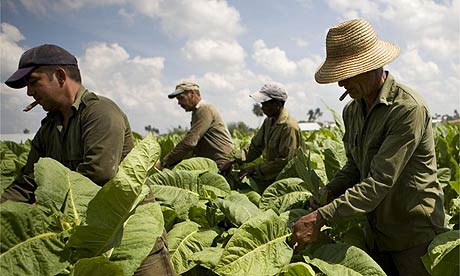guardian.co.uk
Thursday June 12 2008

Farmers work in a tobacco field in the western province of Pinar del Rio, Cuba.
Photograph: Ariana Cubillos/AP
Cuba is to abandon egalitarian salaries after decades of government control in a bid to improve the nation's productivity, a senior government official has revealed.
It is thought that an end to the capped wages set up by Fidel Castro in 1959 could spark the beginnings of a new middle class in Cuba.
In an interview published in Granma, the Communist party's daily newspaper the minister for labour and social security, Carlos Mateu, said the current system gave employees little incentive to excel because everyone earned the same regardless of how much work they put in.
Many government-run companies had already stopped caps on salaries and the rest must do so by August, Mateu said.
"This salary system should be seen as a tool to help obtain better results in output and services," Mateu said.
"Generally there has been a tendency for people to earn the same, and that egalitarianism is not helpful.
"That is something that we have to fix ... because if it is harmful to pay workers less than they deserve, it also is harmful to pay them what they have not earned," he added.
He said that the new compensation system fits with the mantra of "socialist distribution" mentioned regularly by new President Raul Castro: "From each according to his ability, to each according to his work."
For years in Cuba, jobs as varied as farm workers and doctors only had a difference in their wages of the equivalent of a few US dollars a month. The average monthly wage in Cuba is around $20 (£10) leaving many Cubans struggling to make ends meet.
Details of the new system have not been specified as yet and it remains unclear if officials plan to pay higher regular salaries for better workers, or if they would just receive bonuses for good performance.
Lizette Fernandez, a former dissident who campaigned for a change in Cuba's dual currency system until she moved to Florida last year told the Miami Herald: "I think of all the changes made so far, this one is the most important.
"If you worked in an office in Cuba, you often got paid the same as the person who cleaned the office. Slow and lazy people got the same or even more, because the bosses got their jobs through political connections and didn't do any work."
In real terms, she added, the change could mean as little as 50 cents.
"Fifty cents may not sound like a lot, but at the end of the month, it's the difference between being able to buy one bar of soap and two bars of soap," she said.
"This change offers hope that they will increase salaries even more."
Raul Castro, 77, who came to power officially in February taking the place of his older brother Fidel, 81, when his ailing health finally became too much, has made significant changes allowing Cubans for the first time to buy their own mobile phones, computers and spend nights in hotels.
Some of his policies are still at issue, including opening the country to private enterprise and the freedom for Cubans to travel abroad.
No comments:
Post a Comment